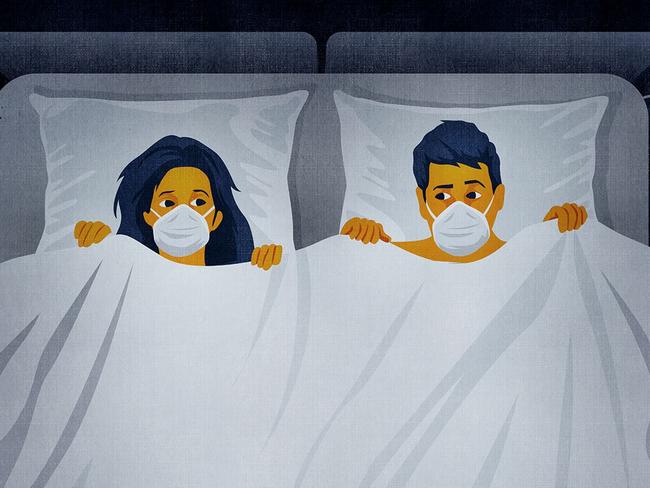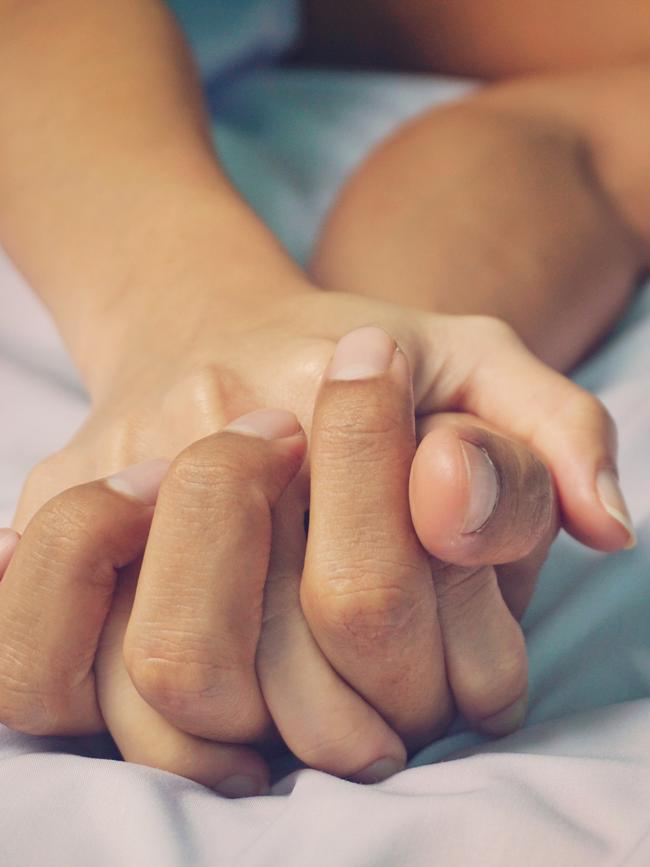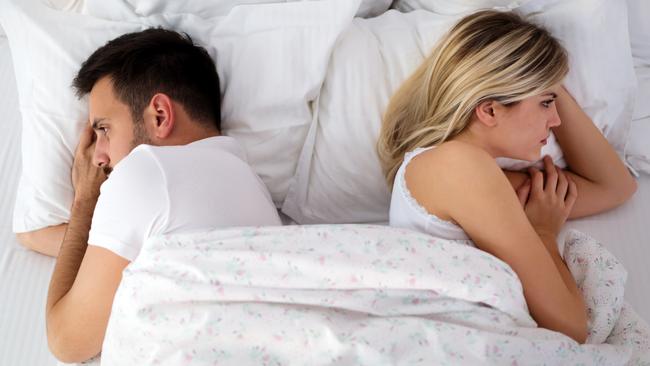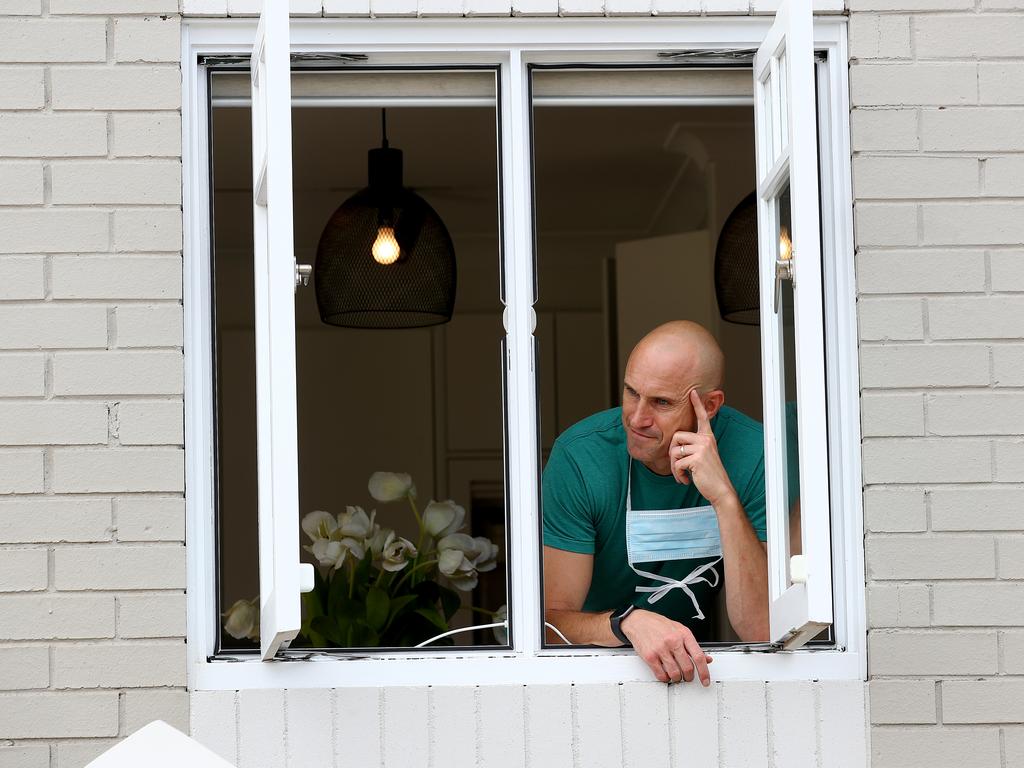Sex in the time of coronavirus
Stress and fear are taking a toll on intimacy. But practising ‘mindful sex’ can help you better connect with your partner.

Last week, Marcus Anwar had an offer he never thought he would refuse: “Do you want to have sex?” his girlfriend asked.
Mr Anwar said no.
“I had been watching the news and I had too much on my mind,” says the Toronto-based 30-year-old founder of a classified-advertising website. “I was worrying about a recession, about my elderly parents, about whether I would accidentally make my girlfriend sick.” So Mr Anwar turned to his girlfriend and tried to let her down gently. “How about tomorrow?” he asked. She smiled and replied: “OK, I understand.”
How’s your sex life?
It’s a tough time for intimacy, when people are terrified that kissing, touching or even breathing on someone could be deadly. Stress and fear are big libido buzzkills. And even if you can get in the mood, privacy may be hard to come by, with kids and anyone else you are quarantined with home all the time.
Early in the pandemic, many people speculated that there would be a baby boom next winter. Experts now say that probably won’t happen. Research has shown that baby booms sometimes follow low-severity stressful events that end quickly — like the threat of a tropical storm — because people respond emotionally. But when the trauma is intense and remains high over time — such as after September 11 — there’s typically no baby boom. People are too anxious to think much about sex. And they question the wisdom of bringing a baby into the world. In the case of the coronavirus, there are also worries about whether a pregnancy, and baby, would be healthy.
“A state of high threat, characterised by stress or anxiety, is not conducive to having sex,” says Justin Garcia, acting executive director and research director of the Kinsey Institute at Indiana University. “There’s a reason gazelles don’t mate a few feet in front of a lion.” There’s another factor at play, too, Dr Garcia says. Humans have evolved to have a disgust response, an innate tendency to avoid things that have the potential for disease transmission. This is why we’re grossed out by faeces or maggots or rotten food. And it’s why we might be turned off by the idea of kissing right now: Our lover could unknowingly harm us.

Last month, Dr Garcia and colleagues at the Kinsey Institute launched an online study called “Sex and Relationships in the Time of COVID-19.” The initial results, of a sample of 1200 participants, show that half are having less sex since the pandemic began. Yet, those who are still having sex are often trying something new, especially among younger adults, people living alone, those who feel lonely, and risk-takers. The most common new activities were sexting, sending nude photos to someone else, trying a new sexual position and sharing fantasies with a partner. But some people were experimenting with activities that are not overtly sexual, such as taking a bath or shower with a partner.
Is sex safe now, though? In March, the New York City Health Department put out guidelines on sex and COVID-19. Doctors caution that the coronavirus is new, so the data so far is incomplete. The virus has not been identified in semen or vaginal lubrication, doctors say. However, it can be transmitted via saliva and breath, and research has found the virus in the stool of some patients. In other words, the actual act of intercourse isn’t dangerous. But getting close enough to breathe on another person or swap spit is.
“The decision to have sex is not very different from the decision you make to be in the same room or be closer than 6 feet with a person,” says Lauren Streicher, clinical professor of obstetrics and gynaecology at Northwestern University’s Feinberg School of Medicine. “The risk is the same.” To help people navigate this, Dr Streicher divides sexual activities into three categories: absolutely OK, probably OK, and absolutely not OK. Masturbation — at least 6 feet away from your partner — is absolutely OK. Also perfectly safe: “If you and your partner are essentially on a desert island and have no contact with the outside world at all,” Dr Streicher says.
It is probably OK, Dr Streicher says, to have sex with a partner you live with, or who is your regular partner, if you are monogamous and have both been doing an excellent job of social distancing from others. “If you are sitting and having dinner together and breathing on each other, you might as well have sex,” Dr Streicher says.
It’s absolutely not OK to have sex with someone who has symptoms. And this is not the time for a new partner, Dr Streicher says.
Many experts suggest using technology, such as sexting, virtual sex, video or phone sex, or toys that can be operated remotely. But these options aren’t for everyone. First, your libido would already need to be healthy. And they don’t allow for one of the most important aspects of sex, something people especially crave right now: physical touch and a sense of connection. “Sex is meant to be close,” says Susan Orenstein, a psychologist and sex therapist in Cary, North Carolina. “For many people, it’s the tenderness, looking into each other’s eyes, pillow talk, attention and comfort that is important.”

So how can you bring sexy back?
One way: a concept called mindful sex. The idea has been around awhile. In 2002, Lori Brotto, a clinical psychologist who is now a professor of gynaecology at the University of British Columbia, in Vancouver, started using mindfulness — a technique that evolved from meditation — to help female cancer survivors regain their ability to become sexually aroused. Dr Brotto has developed an eight-session in-office program. And there is a form of cognitive behavioural therapy called mindfulness-based sex therapy.
There are two core concepts: Focus on the present moment. And practice being nonjudgmental and compassionate. Techniques include doing a mental scan of your body, to identify tense areas; observing your breath; and focusing your attention on touch when your mind starts to wander with anxiety.
A caveat: Therapists advise that when you’re not feeling up for sex, just don’t do it — and don’t let that stress you out. It’s OK to give yourself a pass and find other ways to connect.
Dr Brotto says mindful sex techniques are especially well-suited to the current moment, as they can help calm the nervous system and allow people to better focus on connecting with a partner. They can also help people address negative feelings, such as fear or guilt.
Mr Anwar describes his pre-quarantine sex life with his girlfriend, whom he has lived with for eight years, as “steamy.” The couple typically had sex four to five times a week, he says. To get in the mood, they cooked together or went out to eat. In the bedroom, Mr Anwar says, they enjoyed kissing, caressing and cuddling. “After nine years, I know what turns her on and she knows what turns me on,” he says.
The pandemic has changed all that. Gripped by stress and the fear that they might inadvertently make each other ill, the couple has sex now just about once a week, if that. Even when they are intimate, it’s not like it was before, Mr Anwar says. Instead of spontaneously starting to make out, now one person will ask: “Do you want to have sex?” They avoid kissing and are careful not to breathe in each other’s faces. “It’s all very mechanical now,” Mr Anwar says.

To recapture their passion, the couple is trying to replicate what they used to do to get in the mood. Although they’re staying home, they dress up in the clothes they would normally wear out for a night on the town. They set a pretty table, cook a nice dinner — steak or chicken with mashed potatoes and roasted vegetables — and turn on some Rachmaninoff.
And they talk. “We acknowledge the fact that this is temporary,” Mr Anwar says. “We will have that passionate sex again. Things will get back to normal.”
Practising ‘Mindful Sex’
Don’t do it if you don’t want to. If sex is going to make you feel even more anxious later, because you’re worried you did something dangerous, skip it. Don’t beat yourself up or feel guilty for not pleasing your partner.
Start practising mindfulness outside the bedroom. There are many apps, such as Headspace, that have guided meditations that teach you to pay attention to your body and the moment. “This reduces over-activation in the brain and enhances our ability to cope with stress,” says Lori Brotto, a clinical psychologist and professor of gynaecology at the University of British Columbia.
Decide why you want to have sex. Do you want to connect with your partner? Manage stress? Take a midday break? Knowing why it’s important to you right now keeps you focused on the present and helps prevent your mind from racing.
Remind yourself that it’s OK if it’s not great. With all the extraordinary underlying stress right now, not many people are having great sex. It’s OK if it isn’t as wonderful as it used to be. Lowering the pressure on yourself will help you relax. “If we live long enough, we will all go through times when our sex life is not mind-blowing,” says Susan Orenstein, a sex therapist in Cary, North Carolina. “Learn to enjoy your body for what it has to offer now.” Have compassion for your partner. Most people aren’t feeling their best right now, physically or mentally. Many are a bit unkempt, and some are struggling with body image. Be understanding and not dismissive of a partner’s concerns. And if you’re having trouble focusing, assure your partner it is not his or her fault.
Breathe. Slowly and deeply. (That sounds sexy, right?) By observing your breathing, you can calm your nervous system.
Focus on your body. Mentally scan it. Are there areas that are tense? Noticing them, Dr Brotto says, reduces activity in the emotional centre of the brain. This leads to corresponding changes in the body: Less cortisol, the stress hormone. Fewer stress-related neurotransmitters. Less muscle tension.
Pay attention to touch. If your mind wanders and you have anxious thoughts, immediately direct it back to the present before it has time to escalate the worry. It’s hard for your brain to focus on pleasure and worry at the same time.
Open your eyes. Make gentle eye contact with your partner. Giving someone your full attention is one of the best ways to show love. Mutual eye contact is sexy.
Broaden your repertoire. If you’re having sex during the pandemic, use the time to explore and connect. New activities don’t have to be overtly sexual — you could try a bubble bath or a massage. Research shows that trying new activities, sexual or not, can invigorate a relationship. Just remember not to judge your partner’s tastes or desires.
The Wall Street Journal





To join the conversation, please log in. Don't have an account? Register
Join the conversation, you are commenting as Logout